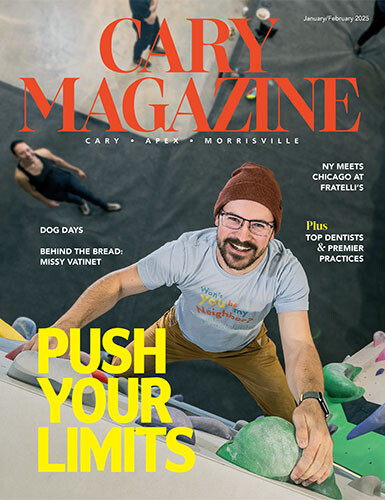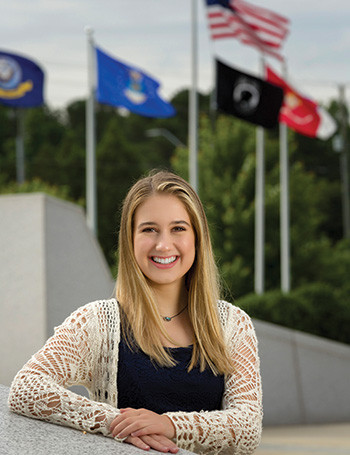
“I didn’t realize this project would impact so many people,” says Rebecca Wicklin of her trip to France to honor a “Silent Hero” of World War II, as part of the Normandy: Sacrifice for Freedom institute. After a year of research, she’s building a website to share her hero’s story. “I hope it broadens (people’s) view of war, and they understand the sacrifices it took to get us where we are today.”
Expand Your View: Rebecca Wicklin
Written By Nancy Pardue
Rebecca Wicklin of Cary is that girl, the one spending her summer poring over 500-page history books while her friends splash at the beach.
But she’s fine with that, because she’s been to visit a new friend — in France.
“At first, it was a project,” said Rebecca of her connection to Army Capt. Philip Edelen. “Then he became an actual person.”
Rebecca met Edelen, a World War II priest and chaplain, through the Normandy: Sacrifice for Freedom Albert H. Small Student & Teacher Institute, coordinated by the nonprofit National History Day and funded by Small, a veteran and recipient of the National Humanities Medal.
At 16 and a rising junior at Cardinal Gibbons High School, Rebecca and her former social studies teacher, Paul Gauthier of St. Michael the Archangel Catholic School in Cary, are among 15 student-teacher pairs selected nationwide for the institute.
Since January, they’ve studied D-Day and World War II in depth and selected Edelen, of Wake County, as their “Silent Hero.”
“You’d think he was a rule follower, but he wasn’t. He was stubborn,” Rebecca said of the chaplain. “He didn’t ‘steal’ a Jeep, but he borrowed one without asking the Army, so he could go say mass.”
Through research and letters they’ve pieced together the life of Edelen, who died on June 10, 1944, four days after D-Day, which was a turning point in the war against Nazi Germany.
“My grandfather was in World War II,” Rebecca said. “He doesn’t talk about it but he wrote a memoir, sort of a diary with pictures. He was shot by a sniper while he was digging a ditch; luckily the bullet glanced off his shovel.”
One of many unsung heroes, it took 72 years for her grandfather to receive his war medals. Rebecca sees that story echoed in Edelen’s.
From census data, war records, and files from the U.S. National Archives and Records Administration, she and Gauthier learned Edelen often gave his own money to soldiers in need, and as a chaplain was unarmed while he ministered on the front lines. He was between 30 and 34 when he died.
He was also from the Catholic Diocese of Raleigh, the same diocese as Rebecca’s school.
“We found his nephew and niece and they sent us pictures and monthly updates Philip wrote to the bishop in Raleigh,” Rebecca said. “We got his personality from them, like when he said (of France), ‘It’s rainy and disgusting here.’ He and I would have been great friends.
“He volunteered,” she added. “He was willing to go into the military knowing he might not come out. I’m surprised at how strong he was in his faith. The records show the number of masses he said, and those numbers kept going up. He was converting people to the faith, marrying people, baptizing them.
“He touched every soul he prayed for or talked to. He had to explain to the soldiers that they weren’t committing murder, that the war was a crusade for their country.”
The experience has been eye-opening for Rebecca, who runs track and cross country year-round, and won her school theater department’s Best Dresser award for her backstage costume work.
“It’s taught me to be grateful for everything I have,” she said. “I saw Phillip growing up nothing like me, saw how hard he fought so we could have a better life. He was selfless.”
Now secretary of her school’s Serving Our Soldiers Club, Rebecca helps host fundraisers benefiting the military, and writes letters to veterans. In History Club, she follows historical events and their impact on today’s world.
In June, Rebecca and Gauthier traveled to Washington, D.C., to complete their research with the help of historians, perusing the National Archives for details such as the name of Edelen’s ship.
Next they visited France, and at Normandy American Cemetery Rebecca stood beside the grave of her Silent Hero to offer a public eulogy.
“It was my opportunity to say, ‘Phillip, this is about all you’ve done, and who you have inspired with your story,’” she said, “and to show him respect.
“My generation, we’ve been at war our whole lives. But to realize these soldiers left the family home and never came back … All five of the kids in Philip’s family were in the military. His youngest brother also died, at the same age my brother is now. In 1944, their mom was named Catholic Woman of the Year (for her hospitality to traveling priests). Everybody worked together then, to save us.”
Rebecca is at work on a website to memorialize Edelen’s service, which she and Gauthier will use in presenting his story to local schools and groups.
“I didn’t realize this project would impact so many people. Now I owe it to Father Phillip, to tell his story,” Rebecca said. “I hope people will look at the site and realize that this is one story, but there are millions. I hope it broadens their view of war, and they understand the sacrifices it took to get us where we are today.”
Editor’s note: See photos from Rebecca’s trip to Normandy, and an update on her project, in the September issue of Cary Magazine.

“Once I found my niche, it was easy to act on this,” says Caroline Le, founder of Abilities Dance. “If there’s nothing else out there, shouldn’t I be the one to do it?”
Driven to Serve: Caroline Le
Written by Nancy Pardue
Sit with Caroline Le for an hour and you’ll learn she’s equal parts passion, purpose and drive.
With a sweet smile and the poise of a CEO, Caroline goes after what’s most important to her, and has the résumé to prove it: Accomplished dancer and choreographer. Green Hope High School grad, Class of 2017. Incoming freshman at UNC-Chapel Hill, planning to study psychology, pre-med. And founder of the nonprofit Abilities Dance, offering free classes to people with intellectual disabilities.
“I dance, literally, every single day,” said Caroline, who began her studies at Cary Ballet Conservatory at age 5, and was part of the honors dance program at Green Hope. “It’s my entire life. I love being able to play all these different characters, and express myself in different ways.”
Blending that passion with a mission to sow a love for dance in others found a purpose, at Abilities Dance.
“The first time I went I was very apprehensive, because I had only seen people with disabilities from a distance and didn’t know how to interact with them,” she said of her volunteer role with Abilities Tennis Association of North Carolina. “Then I got to know who they are, and felt a special connection.”
Quickly realizing she wanted to share her dance expertise with the special needs population, Caroline launched Abilities Dance in 2015 when she couldn’t find a similar group in the area.
“Once I found my niche, it was easy to act on this,” she said. “I thought, ‘If there’s nothing else out there, shouldn’t I be the one to do it?’
“I was 16 then. I decided on a name and a goal — classes that are free and available to all — and I contacted studios until International Ballet Academy (in Cary) offered us free space.”
Her first class consisted of two students.
“I hadn’t taught before then so I took the basic regimen, like stretching and crossing the floor, to their experience level. At the end of that class one of them came to me and said, ‘Thank you for making me a real dancer.’
“He still comes every week, and is learning ballroom dance and competing,” Caroline said. “I helped catapult him into a new world.”
Abilities Dance classes now include students from across the Triangle, ranging in age from 4 to their 30s. The curriculum is based on Caroline’s favorite forms of jazz and modern dance, using “happy” music and teaching simple movement combinations.
“Students register the music more than the dance movements, and way later can still perform the dances we taught them when they hear the song,” Caroline said. “Dance is so articulate, how you hold your head and eyes a certain way. We learn to point our toes and have nice posture, learn the basics and how to execute them safely.
“Dance is a new experience for most of them, but they go head first into it. They love learning new things, and want to keep getting better.”
The students teach Caroline, too.
“I’ve learned to slow down, and go step by step,” she said. “Positivity is important, and motivates our students to try. They’re not as different as you think. You don’t have to talk down to them; they know what you’re saying, but might just process it differently. They’re normal people, and deserve the same respect.”
Caroline also manages the nonprofit’s website and events, and a volunteer staff of her best dance friends. Supportive dance parents help cover the cost of T-shirts and jackets, but she funds any other needs of the nonprofit.
“You have to prioritize,” Caroline said. “I have to always be on top of the calls and emails. I have my calendar and a to-do list every day, to stay on track.”
Caroline plans to audition for dance clubs at college, and to continue teaching Abilities Dance. She is also set on becoming a physician who specializes in treating people with disabilities.
“I’ve always wanted to be a doctor, but special needs is what I’m meant to do,” she said. “This population doesn’t have as much access to doctors due to communication issues, and there’s no training for that. I want to be that physician.”
Caroline is known by her friends as “super-driven,” and embraces the title.
“Driven means you want to see yourself get better and reach certain goals,” she said. “It’s internal, not so that others see you achieve.
“I want people to know they should go after their passions,” Caroline said. “You get so much out of it.”
Editor’s note: Learn more about Caroline’s nonprofit, at abilitiesdance.org.
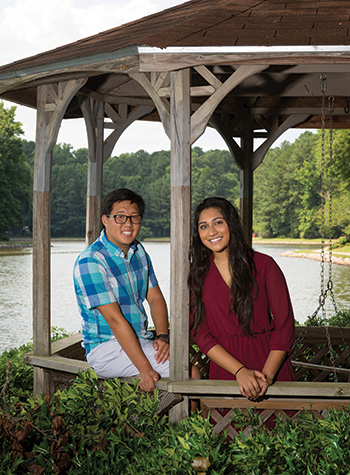
Reese Geyer and Riya Thomas, who set up a nonprofit to fight human trafficking in Nepal, have been friends since middle school. “We’re pretty much like siblings by this point,” Riya says.
“We have to help:” Reese Geyer and Riya Thomas
Written by Amber Keister
When planning a community service project, most teens think food drive or volunteering close to home. Not Reese Geyer and Riya Thomas.
Instead, the two 17-year-olds went to Nepal last November to help victims of human trafficking.
Their journey from suburban North Carolina to the mountains of Kathmandu began in June 2016 after they watched “Nepal’s Stolen Children,” a CNN documentary about the practice of selling young girls into the sex trade.
“We know where we have to go next, to Nepal. We have to help these people,” said Reese, of his feelings after seeing the program.
The two Cary Academy students, with their families’ support, were uniquely placed to make that happen. Reese’s mother, Lisa Geyer, had traveled with groups of middle and high school students and knew how to plan such a trip. Riya’s family had traveled to India many times.
Regardless, it was a daunting task.
“It took a lot of time and research to make sure the kids were going to have the most impact and a meaningful experience,” said Geyer. “It was truly due to their dedication that this endeavor was such a success.”
Reese and Riya set up a website, a Facebook page and a nonprofit, Steps for Freedom, to bring attention to their mission. They wrote hundreds of letters asking for donations of money and goods.
They collected enough to fill five large duffel bags with clothes, toothbrushes, toys and other donations. They also raised more than $1,000 to buy food and school supplies in Nepal.
“We had little to no expectations about the amount of support we would actually get,” said Riya. “Going into the coming years we’re going to continue this, and we have more ideas for public awareness and fundraising that we hope to expand.”
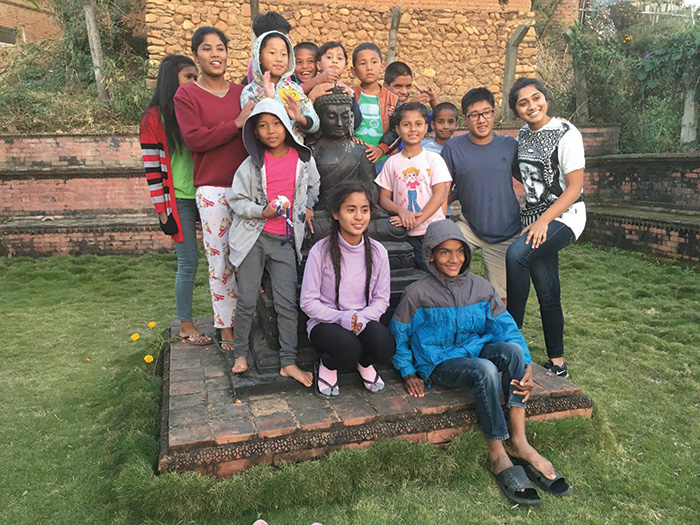
Reese Geyer and Riya Thomas, right, brought supplies to a home for abanboned children about an hour outside Kathmandu. Mostly girls live at the orphanage, and the education they receive helps them to be self-sufficient.
In Nepal
The two friends and their mothers arrived in Nepal with a desire to help, but few ideas how to accomplish that beyond distributing the donations they had brought with them.
“It was hard for us to jump right into it, because we didn’t know exactly how,” said Reese.
“Since it was our initiation year, we wanted more to know what to do,” added Riya.
They visited an orphanage about an hour outside Kathmandu, which houses about 30 children who have been abandoned by their parents. Supported by donations, the home’s founder provides an education for the children, to offer girls more economic options.
Reese and Riya also visited the headquarters of Maiti Nepal, which works to rescue trafficked girls and rehabilitate those who have been forced into prostitution. According to the website Friends of Maiti Nepal, nearly 20,000 girls from Nepal are sold into Indian brothels every year.
Maiti Nepal founder Anuradha Koirala has helped more than 12,000 girls since 1993, and was a focal point of the CNN documentary which inspired the teens’ trip. In 2010 she was awarded the CNN Hero of the Year Award.
Unexpectedly, Riya and Reese met their hero during their visit.
“That was amazing,” said Riya. “We were in awe, how one seemingly inconsequential person could accomplish so much.”
At the end of the meeting the 67-year-old activist had a special message for Reese, which he recounts on the Steps for Freedom website: “Not many boys are willing to get behind this cause,” she said. “You are what all men should be: compassionate and strong.”
Next steps
After returning to the United States, the teens have retained their enthusiasm for the cause. And their time in one of the poorest countries in the world has left them with an appreciation for the opportunities they’ve been given.
“We have an awareness now that is something most people don’t have, have access to, or even dream of having,” said Reese. “It was humbling, and we’re grateful.”
This awareness and their experiences in Nepal have made the two rising seniors more confident in their plans for the future.
“Helping people is something I’ve always wanted to be part of. I’ve been thinking medicine for my career,” said Riya. “The trip has strengthened that desire to help people in need.”
She eagerly describes an upcoming medical mission trip to Belize, where she will give vaccines, dispense medication, and help with other basic care.
Reese added, “I’ve always wanted to get into international affairs, and somehow integrate my love of travel into my work and what I want to do. The trip solidified my passion for global studies.”
Between college preparations and sports practices, the friends are also planning their return to Nepal in November.
They’ve set up a campaign on gofundme.com, with a goal of raising $8,000. And they want to educate their fellow students about human trafficking and the impact a bunch of teenagers can have.
“How can two 16-year-olds ever have a chance to make a difference? But we did, maybe not a huge impact, but we made small impacts which all add up,” said Reese. “You have to do what you can.
“The main thing is to be aware and make others aware,” he said. “That awareness will lead to involvement and volunteering.”
Editor’s note: Learn more about Reese and Riya’s nonprofit, at stepsforfreedom.com and facebook.com/steps4freedom.
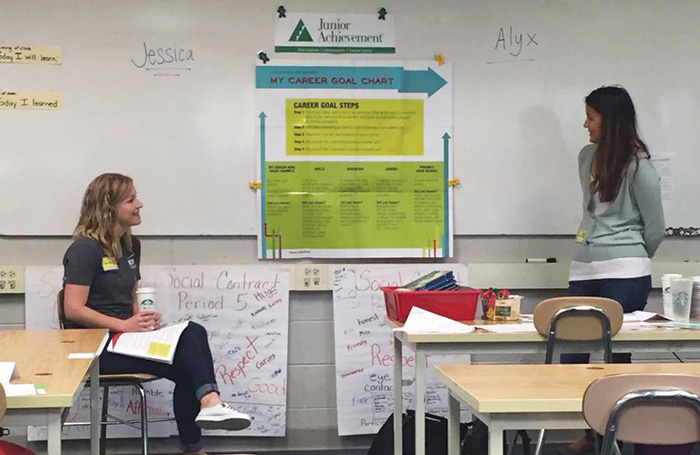
In June, volunteers with Junior Achievement led young people through exercises and games to help them think about future careers, budgeting and financial literacy at East Wake Middle School.
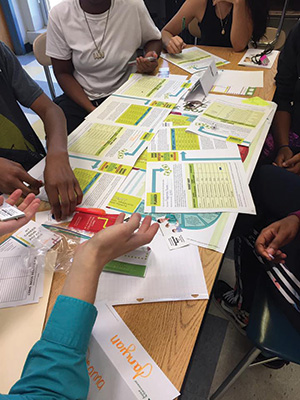
Help Build Future Notable Teens
Student success has many facets, and results from a team effort between young people and teachers, parents and volunteers.
You can be part of that effort through the nonprofit Junior Achievement of Eastern North Carolina, which creates partnerships between schools, sponsors and corporate and community volunteers to teach financial literacy, workforce development and entrepreneurship, aimed at promoting success within our global economy.
“All Junior Achievement programs are available to Wake students in kindergarten through high school,” said operations coordinator Dena Birks, and align with North Carolina’s Common Core Standards.
This coming school year, new pilot programs will include JA Inspire, or Career Day; JA STEM Summit; Entrepreneurial Launch Lesson; and Virtual Finance Park.
“Junior Achievement programs provide the tools that allow students to recognize future possibilities that truly excite them and drive their engagement,” Birks said, and help teachers achieve annual student-growth goals.
You can help: Teachers can request a program for their own classrooms, while others can volunteer to teach a Junior Achievement program in a local school, or donate to the cause.
For more details, visit juniorachievementnc.com or call (919) 821-2100.
- Eat Your Veggies
- Pizzeria Faulisi
- Stand Up
- Notable Teens 2017
- Gotta Cache Them All
- Distill My Heart
- Watering Wisely
